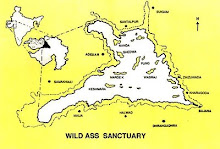Background
Salt making activity has the history of more than 700 years in India. After independence this activity has shown significant growth with 9 fold increase in its annual production. Today, India constitutes 7% of world’s total salt production. In 2005-2006, country produced 18 million tones and ranked 3rd in the world.
Gujarat, Rajasthan, Andhra Pradesh and Tamil Nadu share major portion of the total salt production in India. While Gujarat produces both marine as well as inland salt, Rajasthan produces only inland salt and the rest two only have the marine one. The total workers engaged in salt making and allied activities are estimated to be more than Salt workers are largely un-organized.
Working conditions:
Salt workers work in extreme weather conditions. They are exposed to hot sun, high velocity wind and extreme cold conditions in areas like Little Rann of Kutch. The reflections from the heaps of salt affects the sight, where as saline water affects the skin and also increase blood pressure. Salt production areas are usually very far from that of the revenue village/settlements, there by creating severe issues in regards with basic facilities like water, electricity, road, health and education.
The most important issues, is of low return to the workers. The payments are mostly done on piece rate or daily basis. However the returns are very low compared to minimum wages of the state. In Gujarat, the condition is so worst that the workers are getting payment as low as Rs.30 per day. Salt pan workers do not have access to market or value addition, thus fall pray in the hands of brochures & traders.
Intervention of Government and Civil Society:
Central and state governments do have specific welfare schemes for the salt pan workers. In state like, Gujarat there is special committee called “Empowered committee” which looks after development of salt industry and welfare of workers. However, there is no separate policy or framework for operation. Thus many a times such measures seem to be adhoc.
Voluntary organizations do have played important role in awareness generation and capacity building of workers, and coordinating for effective implementation of the various schemes. In state like Andhra Pradesh and Gujarat, government has recognized their role and included them in policy making committees.
Need for greater collaboration:Looking at the present industrial growth in coastal states, especially in soda ash chemical industries, the market for salt is going to increase. This will also increase the possibility that the issues related to working condition and violation of basic workers rights become more severe. Thus there is need to understand the challenges, build common understanding and advocate for uniform policy framework to regulate working conditions of salt pan workers.
Agariya Heet Rakshak Manch (A forum of organizations and individuals committed to work in issues of salt pan workers) has taken initiative in this context by proposing to organize a national consultation. AHRM is being actively working on 7 districts of Gujarat with support from CARE India, as part of SNEHAL programme. The event will be jointly supported by CARE, Mahatma Gandhi Labour Institute (MGLI), and Industries Commissionerate, GOG. The organizers of the consultation are Central Salt Commissioner’s Office, Industries Commissionerate, Tamil Nadu Salt Corporation Limited, Indian Salt Manufacturers Association, Pathey (Gujarat), along with AHRM, CARE India and MGLI.
The consultation will invite representatives of all important stakeholders like Industries department of all salt producing states, Representatives of cooperative societies, workers, unions, federations and small scale slat manufacturers along with voluntary groups and community organizations concern towards issues of salt workers.
We are sure that this initiative will find very good response from the state governments of various salt producing states as well as other stakeholders in the process and will result into a policy framework ensuring better working conditions of salt workers in India.
ORGANISERS:
· Central Salt Commissioner’s Office – GOI
· Industries Commissionerate – GOG
· CARE India (Gujarat)
· Agariya Heet Rakshak Manch (AHRM)
· Tamil Nadu Salt Corporation Ltd (TNSC)
· Indian Salt Manufacturers Associations (ISMA)
· Mahatma Gandhi Labour Institute (MGLI)


.jpg)
.jpg)
.jpg)
.jpg)




No comments:
Post a Comment